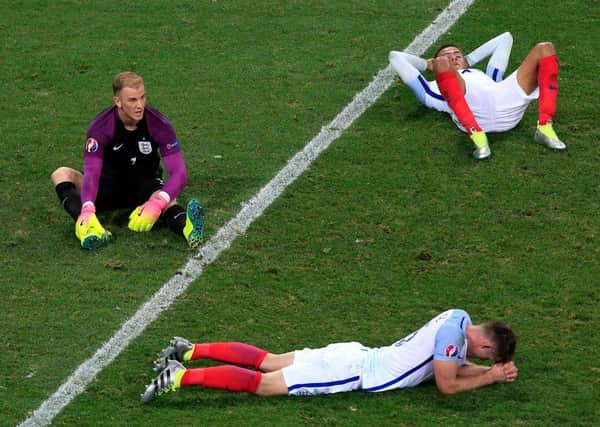Psychologists claim fear of failure undermines England


Despite muted expectations going into the competition and a youthful squad of exciting Premier League talent, once again the national side buckled when the pressure was on at an international tournament.
Their embarrassing exit from Euro 2016 at the hands of the smallest nation ever to feature at a major international football tournament, Iceland, was no less than the Three Lions deserved on a night of virtually zero creativity and cohesion in France.
Advertisement
Hide AdAdvertisement
Hide AdThis was the manager, Roy Hodgson’s, third tournament at the helm of the national side following his appointment in 2012 and again England were found wanting.
Not since the victorious 1966 World Cup campaign on home soil has England tasted glory. Since then generations after generations of England teams have delivered disappointment.
Some psychologists believe that the years of successive, high-profile failures have taken their toll on the players - and this latest failure will prove to be a further mental blow.
Sir Cary Cooper, professor of Psychology and Health at Manchester University, said he fears the team could be saddled with some heavy mental baggage following Monday’s desperate defeat in the last 16 knockout stage.
Advertisement
Hide AdAdvertisement
Hide AdHe said: “It’s so sad. I’ve never seen such a poor performance. They weren’t up for it and I don’t understand why.
“They didn’t gel as a team. That is the main criticism of Hodgson. For some reason he didn’t know which team to put out there, he didn’t know what players would fit together to make a team. That was obvious.
“They’ll feel bad. This is very humiliating. It will have an impact on them and their self-confidence. Their clubs will have to be careful how they deal with them because they’ll come back with a failure chip on their shoulders. It will stay with them.”
That England were such clear favourites to beat Iceland before the game meant there were “overwhelming” expectations on England’s players, Prof Cooper said.
Advertisement
Hide AdAdvertisement
Hide Ad“You have everything to lose in terms of expectational pressure in this kind of scenario - you are playing a team from a country where only 40,000 males are of a footballing age; the expectations are overwhelmingly that you are going to win and you should be able to beat them.”
The fact that so many players “choked” when the pressure was on is what astounded Doctor Chris Rowley, programme leader for sports psychology at Leeds Trinity University.
“I can understand that on an individual basis but I can’t understand how it impacts on so many people - and so consistently.
“These are players who have had fantastic seasons but put them in an England shirt and it seems to weigh heavy on them. “Against Iceland, there was a sense that they didn’t want to take any risks so they don’t make any mistakes.
Advertisement
Hide AdAdvertisement
Hide Ad“The fundamentals of their game are lost when the pressure is cranked up.
“In an ideal world you would sit down with the players who are suffering and try to get them to talk about it. ”
Individual England players of the past have often been vilified for their failures on the international stage. One example is the ordeal David Beckham endured after his red card against Argentina in the 1998 World Cup. At Manchester United’s first away game of the season, at West Ham, a Beckham effigy was seen dangling from a hangman’s noose.
Dr Rowley believes players must be inhibited by such over-reactions.
“Consciously or not, it has to play on their minds; they don’t want to be the next subject of a national hate campaign,” he said.